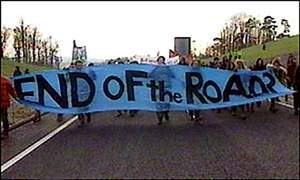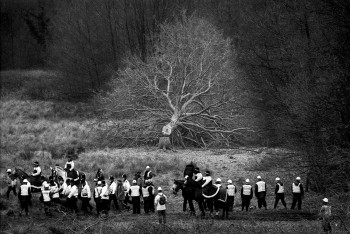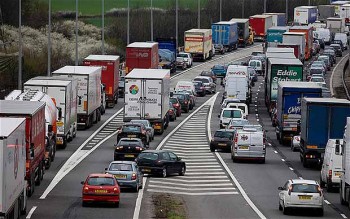
“Shut shit down!” is one of the rallying cries of the new wave of black radicalism sweeping across the USA in the wake of events in Ferguson in 2014.
Whether it’s occupying a police HQ or blocking the highway for a few hours, the emphasis is on putting a spanner in the works of the system – and on how easy it is to do so, even with relatively small numbers.
There is an obvious parallel here with the call by the Invisible Committee for rebels to focus their resistance on the infrastructure of capitalism.
The capitalist industrial system can often seem too big and powerful for us to take on. On a physical level it can literally deploy armies against any uprising and on a psychological level it has a powerful hold on the minds of the public.
Looking for some kind of interface with this vast, multi-faceted entity – some real context in which we can physically oppose it – has often proved difficult.
Choosing a particular field on which to engage in battle can be seen as narrow or merely symbolic. Workplace struggles, for instance, do take place at a real point of contact between the system and the population, but are limited in their perspective and risk becoming reformist, of obscuring the more fundamental nature of our revolt.
Fifteen years or so ago, the anti-capitalist movement discovered international summits as a tangible target for resistance to that intangible thing called neo-liberalism. But this approach was dismissed by some (wrongly, in my view) as focusing attention too much on the symbolic level of the event rather than on the broader reality of what it represents.
There is nothing new about targeting the infrastructure of the system, as the ZAD protesters at Notre-Dame-Des-Landes near Nantes, the No-TAV campaigners of northern Italy and so many others across the world are currently doing. Indeed, in the UK the late-1990s anti-capitalist movement was largely inspired by Reclaim the Streets and the anti-roads battles of Twyford Down, Wanstead and Newbury.

The strength of that approach, as the Invisible Committee and the Black Lives Matter movement have appreciated, is that it is a real physical attack on a real physical manifestation of capitalism.
On one level, industrial capitalism is indeed a concept rather than a physical thing. But on another level it also has a real physical presence, in the material world in which we operate, and can be challenged on that level.
Ideally, the physical resistance to capitalism would be informed by (more than that, in fact – permeated by, animated by, inspired by!) a profound understanding of what capitalism is and how deep it has sunk its claws into human life.
Ideally, this physical resistance would be the incarnation of a complete refusal of the industrial capitalist system, together with all the layers of lies and assumptions with which it tries to stifle our freedom, our desire to fight for freedom, our realisation that we can fight for freedom, and even our understanding that we are not free.
This refusal would consciously reject the biggest illusion of all – that the world can only be the way it is now. It would step free from the mind-prison of accepting that there have to be jobs, bosses, wars, money, corporations, governments, CCTV cameras, supermarkets, motorways, TV stations, factories, pesticides, drones, airports, chemicals, plastics, tourism, police, courts, land ownership, consumerism, insurance policies, borders, fear, obedience and conformity.
It would cast aside the absurd and unquestioning faith in the literally impossible myth of never-ending “development”, “growth” and “progress” and see the process for what it is – a cancer destroying our planet.
It would break through the mental barriers of regarding humanity as a collection of individuals, or groups, or peoples and see that it is one entity, whose physical existence is marked by the multiplicity of its forms.
It would shatter the concept of the “environment” as being something outside of ourselves and understand that humanity is a part of the living world, that nature is not something we observe or catalogue but something we incarnate.
And with the strength of this holistic understanding, this spirit of complete refusal would throw itself into attacking capitalism on a physical level, with a greater dream as its inspiration.
Behind the shutting down of motorways, city centres, police stations, airports, fracking sites, capitalist summits or arms fairs would lie the overarching desire – the need, even – to shut down the industrial capitalist system itself. Everywhere. Permanently.
And then we could all start to live.

Leave a Reply